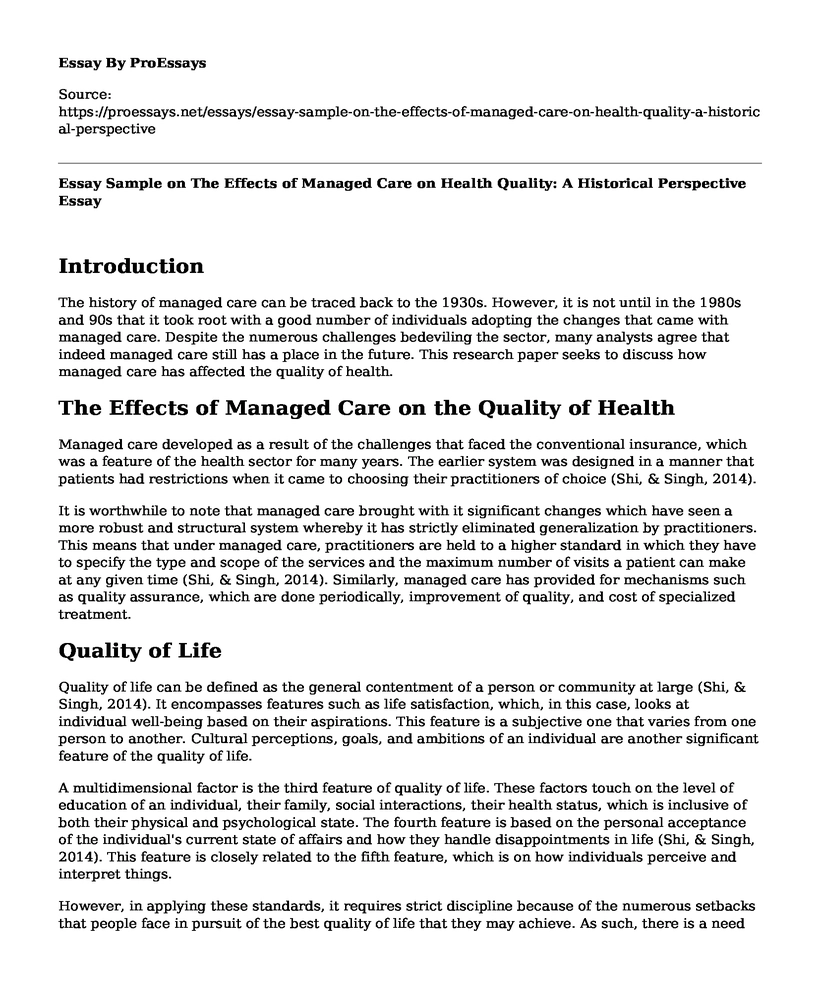Introduction
The history of managed care can be traced back to the 1930s. However, it is not until in the 1980s and 90s that it took root with a good number of individuals adopting the changes that came with managed care. Despite the numerous challenges bedeviling the sector, many analysts agree that indeed managed care still has a place in the future. This research paper seeks to discuss how managed care has affected the quality of health.
The Effects of Managed Care on the Quality of Health
Managed care developed as a result of the challenges that faced the conventional insurance, which was a feature of the health sector for many years. The earlier system was designed in a manner that patients had restrictions when it came to choosing their practitioners of choice (Shi, & Singh, 2014).
It is worthwhile to note that managed care brought with it significant changes which have seen a more robust and structural system whereby it has strictly eliminated generalization by practitioners. This means that under managed care, practitioners are held to a higher standard in which they have to specify the type and scope of the services and the maximum number of visits a patient can make at any given time (Shi, & Singh, 2014). Similarly, managed care has provided for mechanisms such as quality assurance, which are done periodically, improvement of quality, and cost of specialized treatment.
Quality of Life
Quality of life can be defined as the general contentment of a person or community at large (Shi, & Singh, 2014). It encompasses features such as life satisfaction, which, in this case, looks at individual well-being based on their aspirations. This feature is a subjective one that varies from one person to another. Cultural perceptions, goals, and ambitions of an individual are another significant feature of the quality of life.
A multidimensional factor is the third feature of quality of life. These factors touch on the level of education of an individual, their family, social interactions, their health status, which is inclusive of both their physical and psychological state. The fourth feature is based on the personal acceptance of the individual's current state of affairs and how they handle disappointments in life (Shi, & Singh, 2014). This feature is closely related to the fifth feature, which is on how individuals perceive and interpret things.
However, in applying these standards, it requires strict discipline because of the numerous setbacks that people face in pursuit of the best quality of life that they may achieve. As such, there is a need for balancing all these features, specifically on contentment.
What are the implications of the reforms in the health sector, taking into consideration the adoption of managed care?
References
Shi, L., & Singh, D. A. (2014). Delivering health care in America. Jones & Barlett Learning.
Cite this page
Essay Sample on The Effects of Managed Care on Health Quality: A Historical Perspective. (2023, May 22). Retrieved from https://proessays.net/essays/essay-sample-on-the-effects-of-managed-care-on-health-quality-a-historical-perspective
If you are the original author of this essay and no longer wish to have it published on the ProEssays website, please click below to request its removal:
- Nursing Research and Evidence-Based Practice Essay
- Essay on Nursing: Supporting a Safe Environment
- Paper Example on Health Disparities
- Chemo-Radiation With Cisplatin Advocated For Women With Stage IIIB Cervical Cancer
- Essay Example on Ethical Challenges of 1950s Tacit Consent in NIH Research
- Paper Example on the Amish Culture: Impact of Cultural Values on Medical Care
- Motherhood: A Significant Life-Changing Experience - Essay Sample







